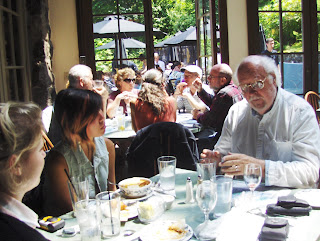There are places to sit, and contemplate, if a chair is needed. There is always time to change and view life from a different angle. Today, is one of those days. Here, in my new- easy-to-cultivate garden, something my parents who grew food for a living would never have imagined, here I say my goodbyes to sixtyfivewhatnow.
Looking from this vantage point spoils us.
Making ourselves suffer less weakens our resolve in some ways.
We expect that life will forever get easier, for everyone.
I've counted over six hundred posts since January 2008, and over 800 followers. By tonight, I will have voted for two presidential elections, and my posts have been vocal about my leanings.
We have seen a financial collapse, the beginning and ending of two wars, half a decade of changes that included hurricanes, tsunami, drought, floods, oil spills, record heat waves, a sweeping change in the Arab World, financial and social changes in Europe, and melting of the ice caps.
Here at home, we have battled many issues, including the most painful of all, losing our son Brian in 2011. We are not over that tsunami event.
After five years of chronicling life after retirement, I'm ready to do something else. I have a couple of other blogs that will allow me the opportunity to continue to communicate with the blogging world, a world that has opened up many friendships, a world beyond my town and my country.
I want to thank you all, for your kindness, your generosity, your friendship. Do drop me an email if you'd like to remain in touch. If you like, join me on Facebook. Better yet, if you plan on travelling to this part of the world, know that there is room for you under this roof, and always a warm meal to share.
May your days be bright.
May your dreams be within your reach.
Rosaria

















































